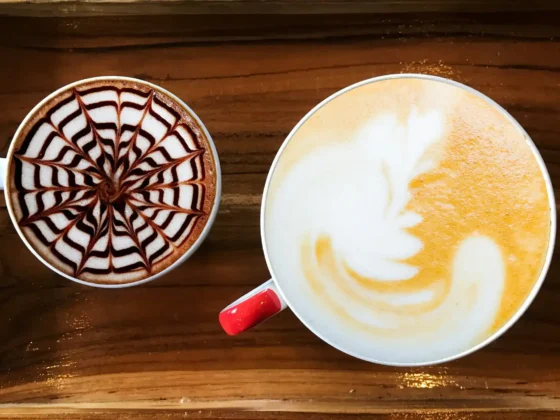As the aromatic scent of freshly brewed Turkish coffee fills the air, a question often stirs in the minds of both connoisseurs and casual drinkers alike: how much caffeine is in Turkish coffee? Steeped in history and recognized for its distinct brewing technique and unique flavor, Turkish coffee has graced tables around the globe for centuries. Yet, despite its widespread popularity, many aspects of this dark, robust beverage remain shrouded in mystery, with the caffeine content being one such intriguing factor. This article is designed to take you on an enlightening journey into the heart of Turkish coffee caffeine. We’ll unpack the science, explore the complexities, and ultimately decode the energy packed in your cherished cup of this traditional brew.
Caffeine in Turkish Coffee: Key Takeaway
- Caffeine in Perspective: Despite its strong flavor, Turkish coffee contains less caffeine per serving compared to espresso due to the traditionally smaller serving size.
- Cultural Brew: Turkish coffee is a cultural symbol steeped in tradition, from the brewing method using a Turkish coffee pot to the practice of fortune reading with demitasse cups.
- Health in Moderation: Moderate consumption of caffeine in Turkish coffee can provide health benefits, but excessive consumption might lead to health issues like disrupted sleep and anxiety.
- Beyond Caffeine: Turkish coffee is more than a caffeinated drink; it’s a ritual, a social tool, and an element of hospitality that has an important place in Turkish culture.
- Breaking Stereotypes: The diversity within Turkish coffee, from its level of sweetness to the choice of spices, challenges common stereotypes, making it a versatile brew catering to a wide range of taste preferences.
Turkish Coffee: A Timeless Tradition
Turkish coffee is a centuries-old beverage that has managed to cement its place in the daily routines and social traditions of various cultures around the world. The secret to its enduring appeal lies not only in its distinct flavor profile but also in its unique brewing method and the cultural significance it holds.
The Origins of Turkish Coffee
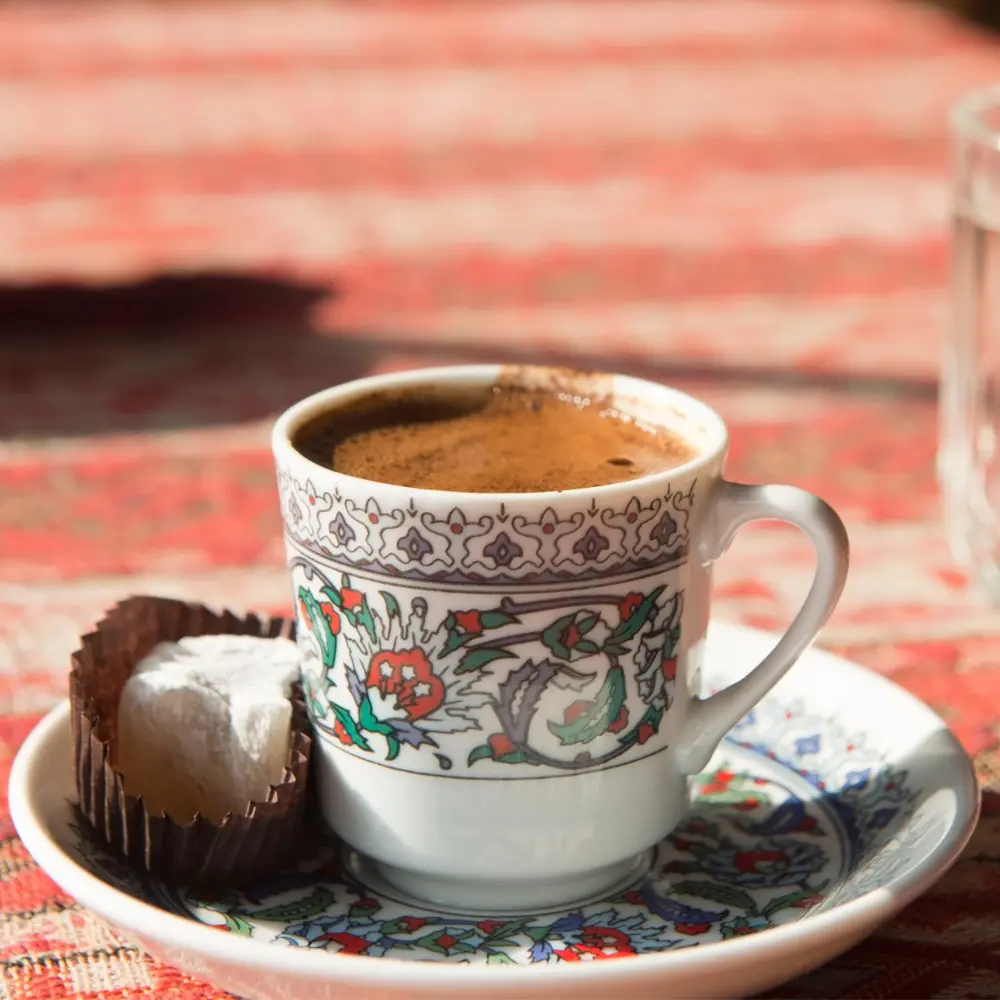
Believed to have been introduced to Istanbul in the 15th century during the Ottoman Empire, Turkish coffee has a rich and diverse history. It all began with the infusion of the Arabica coffee beans that were roasted, finely ground, and then boiled in a special pot known as a cezve. (1) This traditional Turkish coffee pot, made of copper or brass, played a pivotal role in the creation of this renowned beverage. The meticulous preparation process gave rise to a full-bodied and foam-topped coffee, earning it a place in the hearts of many and paving its way across continents.
The Art of Turkish Coffee Brewing
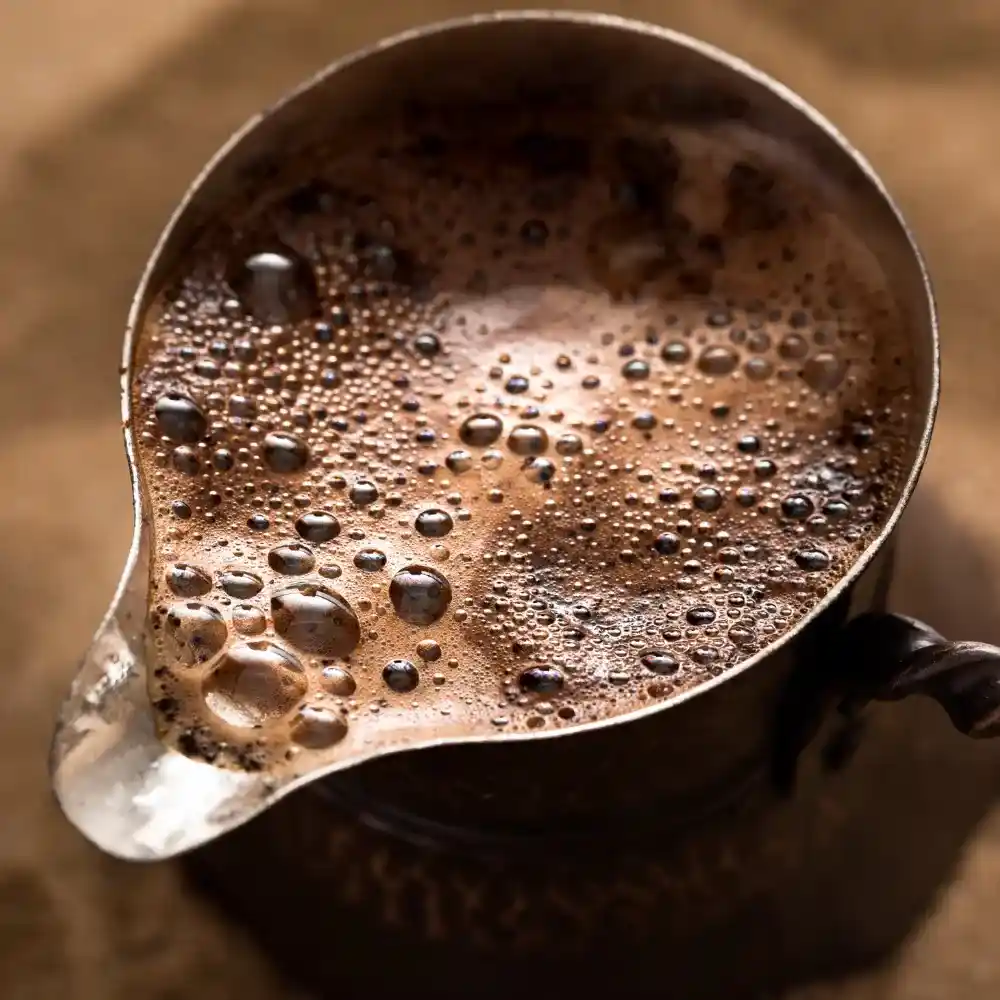
Brewing Turkish coffee is considered an art form. The finely ground coffee beans are simmered (but not boiled) in the traditional Turkish coffee pot until a thick layer of froth forms at the top. Once this froth, or crema, is formed, the ibrik is removed from the heat source. The grounds are allowed to settle, and then the beverage is carefully poured into small, often ornately decorated cups. It is served strong and intense, with the grounds forming a layer at the bottom of the cup. One critical aspect of Turkish coffee brewing is that it’s never stirred after serving. Doing so would disturb the fine sediment at the bottom of the cup.
The Social and Cultural Significance of Turkish Coffee
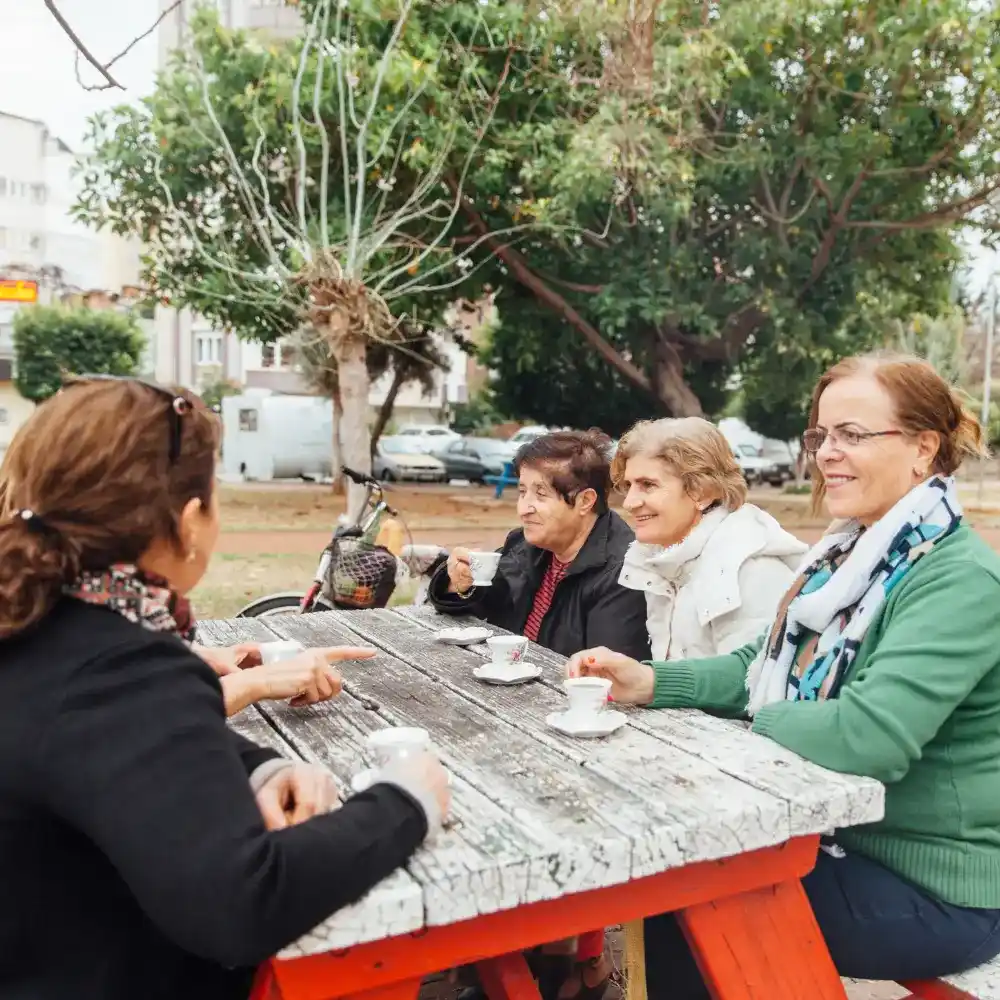
Turkish coffee holds a deeply embedded social and cultural significance. It is often associated with hospitality and is traditionally offered to guests as a sign of friendship and camaraderie.
- Turkish coffee has a special place in social gatherings and is often consumed during moments of relaxation and conversation. The coffee-drinking session can last for hours, with several refills and a spirit of shared enjoyment.
- In some cultures, the tradition of coffee reading is prevalent where the patterns formed by the residue of Turkish coffee in the cup are interpreted to predict the future. This further enhances the mystical allure of this age-old beverage.
- Turkish coffee is also intertwined with matrimonial customs. In many regions, a prospective groom would be served coffee by his potential bride, and the way he drinks it could indicate his acceptance or refusal of the proposal.
This delightful brew is more than just a caffeinated beverage; it is a symbol of history, culture, and social ties, making each cup a captivating blend of tradition and taste.
How Much Caffeine in Turkish Coffee
The question of caffeine content in Turkish coffee is one that has intrigued coffee enthusiasts worldwide. The allure of this rich and robust coffee is not only its unique flavor but also the energy boost it provides. However, the caffeine content can vary significantly depending on several factors, making it a complex subject to delve into.
Measuring Caffeine Levels
Caffeine can be challenging to measure accurately due to the variables involved in its brewing process. However, it’s generally estimated that an average serving (about 2 ounces) of Turkish coffee contains approximately 50-150 milligrams of caffeine. This range is broad because the exact amount can be influenced by numerous factors, including the type of coffee beans used, the roast level, and the brewing time. The way you prepare your beverage can significantly impact the caffeine content, so it’s essential to understand these influences.
Factors Affecting Caffeine Content
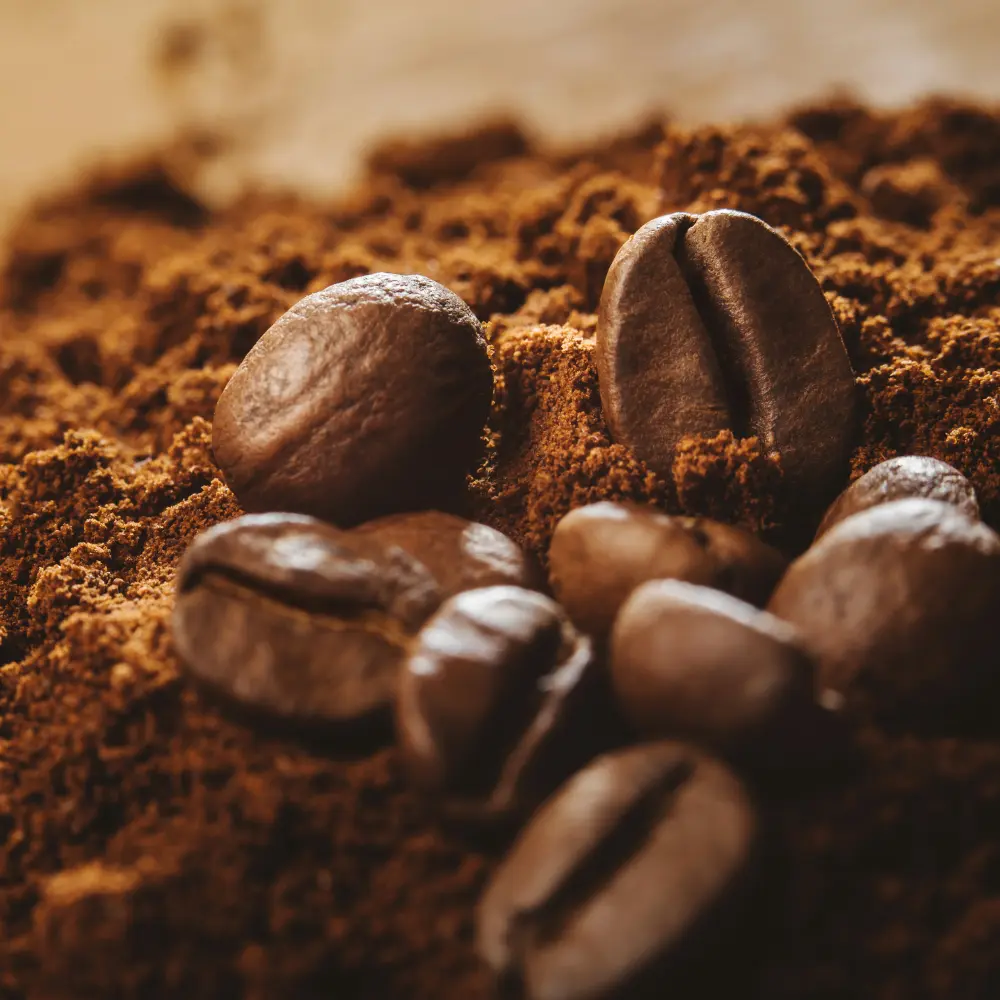
Several factors can affect the caffeine content in Turkish coffee, making each cup potentially unique in terms of its caffeine level:
- Coffee bean variety: The variety of beans used can play a significant role in the caffeine content. Arabica beans, which are commonly used in Turkish coffee, generally have lower caffeine content than the Robusta variety.
- Roast level: The level of roasting can also affect caffeine levels. Contrary to popular belief, light roast coffees actually contain slightly more caffeine than dark roast coffees. The longer roasting time for dark roast breaks down more of the caffeine.
- Brewing method: Turkish coffee is made by simmering rather than brewing, which may contribute to its caffeine content. Simmering the brew over a longer period allows for more caffeine extraction.
- Serving size: This brew is typically served in small cups, which means that while the caffeine concentration may be high, the total caffeine intake might be less than larger drinks.
Turkish Coffee vs. Other Coffee Varieties
In this section, we’ll compare Turkish coffee with other popular coffee varieties to understand how it stacks up in terms of caffeine content and brewing methods. Let’s dive into the heart of the caffeine debate as we pit Turkish coffee against the likes of drip, espresso, French press, and more.
Turkish Coffee vs. Espresso
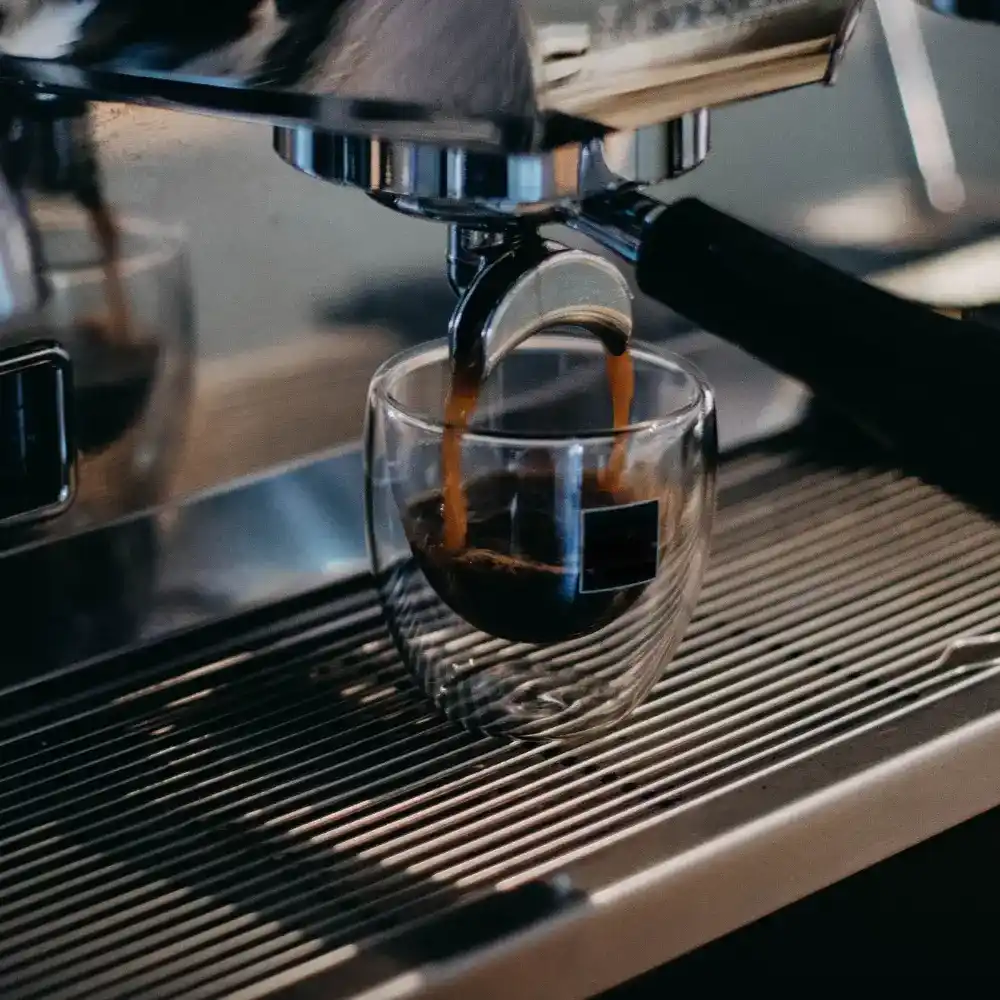
A comparison of Turkish coffee caffeine vs espresso shows that Turkish coffee can have more caffeine per serving. An espresso shot is typically around 30-50ml and contains approximately 63mg of caffeine. Considering that Turkish coffee is served in small but potent portions, it can indeed pack a powerful caffeinated punch, often surpassing that of an espresso shot.
Turkish Coffee vs. Drip Coffee

Drip or filter coffee, a favorite in American households and offices, is brewed by pouring hot water over ground beans in a filter. Drip coffee typically has more caffeine content per serving than Turkish coffee, owing to its larger serving size – usually 6 to 8 ounces. However, Turkish coffee is more concentrated, so if we were to compare them ounce for ounce, Turkish coffee would typically contain more caffeine.
- Drip or Filter Coffee: A standard 8-ounce serving of drip coffee contains between 95 to 165 milligrams of caffeine. When we compare this to Turkish coffee on an ounce-for-ounce basis, Turkish coffee is more concentrated.
Turkish Coffee vs. French Press Coffee

French Press, also known as a plunger or press pot, produces coffee by steeping ground coffee in hot water and then separating the grounds from the coffee by pressing a mesh plunger through the brew. (2) French Press coffee generally has a robust flavor, similar to Turkish coffee, but the serving size is typically larger, meaning it might contain more total caffeine but less concentration per ounce.
- French Press: An 8-ounce cup of French Press coffee contains around 80-135 milligrams of caffeine, slightly less concentrated than Turkish coffee.
Turkish Coffee vs. Cold Brew

Cold brew, as the name implies, is brewed with cold or room-temperature water over an extended period (often 12 hours or more). The resulting beverage is usually smooth, well-rounded, and low in acidity. While a serving of cold brew might contain a significant amount of caffeine, it’s usually less concentrated than Turkish coffee due to the brewing method and larger serving size.
- Cold Brew: A 16-ounce cup of cold brew coffee contains approximately 200 milligrams of caffeine. Despite the larger volume, the per-ounce caffeine concentration is lower than Turkish coffee.
Turkish Coffee vs. Instant Coffee

Instant coffee is made from brewed coffee that has been freeze-dried or spray-dried. It is usually less caffeinated than other brewing methods, including Turkish coffee. This is because instant coffee is generally less concentrated, and less coffee is used per serving.
- Instant Coffee: An 8-ounce serving of instant coffee typically contains between 30 to 90 milligrams of caffeine, which is much less concentrated than Turkish coffee.
Turkish Coffee vs. Moka Pot Coffee

The Moka pot, or stovetop espresso maker, produces a brew by passing boiling water pressurized by steam through ground coffee. The result is a strong, rich brew somewhat similar to espresso. While a Moka pot brew can have a high caffeine content, Turkish coffee still typically contains more caffeine due to the fine grind and direct contact between the coffee grounds and water.
- Moka Pot: A 2-ounce serving of Moka pot coffee contains around 60-90 milligrams of caffeine. While it’s similar in serving size to Turkish coffee, it often contains slightly less caffeine.
Turkish Tea vs. Coffee
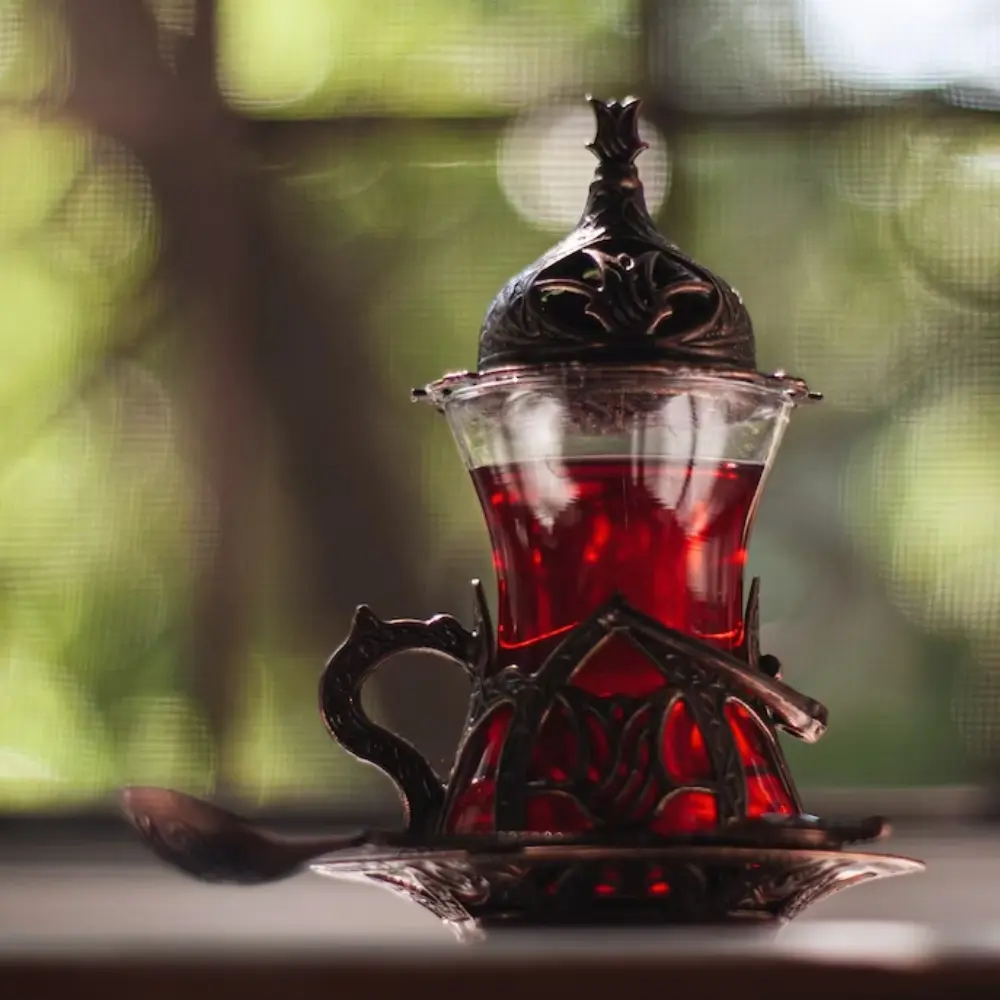
In the debate of Turkish tea caffeine vs coffee, coffee emerges as the clear winner. Turkish tea generally contains less caffeine than Turkish coffee, making the latter a better choice for those seeking a stronger jolt of energy. It’s worth noting, though, that the actual caffeine content can vary based on how strong the tea or coffee is brewed.
Turkish Tea: A standard serving of Turkish tea (about 5 ounces or 150 ml) contains roughly 20-70 milligrams of caffeine, depending on how strong it’s brewed. The lower caffeine content in tea is due to the nature of the tea leaves themselves, which contain less caffeine than coffee beans. Also, the brewing process of tea tends to extract less caffeine.
Each of these coffee types offers a unique experience in terms of flavor, brewing method, and caffeine content. Turkish coffee stands out for its potent brew, rich tradition, and the intimate, communal experience it offers to its drinkers. Regardless of the caffeine content, the choice between Turkish coffee and other varieties often comes down to personal preference and the experience one seeks from their cup of coffee… or tea.
Understanding the Impact of Caffeine on Health
As a central nervous system stimulant, caffeine has both positive and negative effects on our health. Understanding these effects can help you manage your consumption of caffeinated beverages like Turkish coffee and achieve an optimal balance for your well-being.
Pros and Cons of Consuming Caffeine in Turkish Coffee
When consumed in moderation, the caffeine in Turkish coffee can have several benefits:
- Enhanced Alertness and Concentration: Caffeine can help improve mental alertness, cognitive function, and concentration. (3) It achieves this by blocking the neurotransmitter adenosine, which promotes sleep and relaxation, thereby increasing the activity of other neurotransmitters like norepinephrine and dopamine.
- Physical Performance: Caffeine stimulates the nervous system and prepares your body for intense physical exertion. It also increases adrenaline levels, which can enhance physical performance.
- Nutrient-Rich: Turkish coffee is rich in antioxidants and contains small amounts of vitamins and minerals, which contribute to overall health.
However, consuming too much caffeine also has its downsides:
- Anxiety and Restlessness: High doses of caffeine can lead to jitteriness, and restlessness, and even exacerbate anxiety disorders. People have different thresholds for how much caffeine they can tolerate.
- Digestive Issues: Excessive caffeine intake can lead to digestive problems, such as acid reflux and stomach ulcers.
- Dependency: Regular intake of caffeine can lead to dependence, whereas stopping its consumption leads to withdrawal symptoms like headaches, fatigue, and irritability.
How Caffeine Affects Sleep Patterns

Caffeine’s primary function is to keep us alert by blocking sleep-inducing chemicals in the brain and increasing adrenaline production. While this makes it effective for staying awake during the day, consuming caffeine close to bedtime can interfere with the natural sleep cycle.
Caffeine can delay the timing of your body clock and reduce the total amount of sleep you get. Its effects can also vary greatly among individuals, with some being able to sleep soundly after a cup of Turkish coffee while others toss and turn all night. Factors such as age, caffeine sensitivity, and the time of consumption can affect how caffeine impacts your sleep.
Managing Caffeine Intake for Optimal Health

Balancing the benefits and drawbacks of caffeine requires careful management of your caffeine intake. Here are a few tips:
- Monitor your consumption: Keep track of the amount of caffeine you’re consuming daily from all sources, including coffee, tea, soft drinks, and chocolate.
- Limit late-day caffeine: To avoid potential sleep disruption, avoid consuming caffeine later in the day. A good rule of thumb is to avoid caffeine within six hours of bedtime.
- Start your day with water: Before reaching for your morning cup of joe, drink a glass of water to kickstart your hydration for the day.
- Listen to your body: Everyone responds differently to caffeine. If you’re experiencing negative side effects, it might be worth cutting back or consulting a healthcare professional.
Understanding the impact of caffeine on health and managing your consumption is crucial, particularly for lovers of potent caffeinated beverages. While this drink is a delight for the senses and a link to a rich cultural tradition, remember to enjoy it responsibly for your health’s sake.
The Art of Enjoying Turkish Coffee
Turkish coffee is more than a beverage; it’s an integral part of Turkey’s history and culture and a ritual that’s shared with family and friends. From the traditional serving etiquette to the complementary treats and incorporation into modern recipes, let’s explore the art of enjoying this coffee.
Traditional Turkish Coffee Serving and Etiquette

Turkish coffee is traditionally served in small, ornamental demitasse cups. The cups, usually made of porcelain, are often beautifully decorated, further enhancing the experience. Serving is a ceremonial act of hospitality, an offer of friendship and conversation.
As discussed, the drink is typically brewed in a “cezve” or a small long-handled pot, usually made of copper or brass. The beverage is often prepared in front of the guest, making the brewing process part of the experience. Once ready, the drink is carefully poured into the demitasse cups, allowing the thick layer of foam to evenly distribute among the cups.
An interesting aspect of Turkish coffee culture is the tradition of coffee fortune reading. After finishing the drink, the cup is commonly turned upside down on the saucer, and once it’s cool, the patterns formed by the grounds on the inside of the cup are interpreted to predict the drinker’s future.
Pairing Turkish Coffee with Delightful Treats
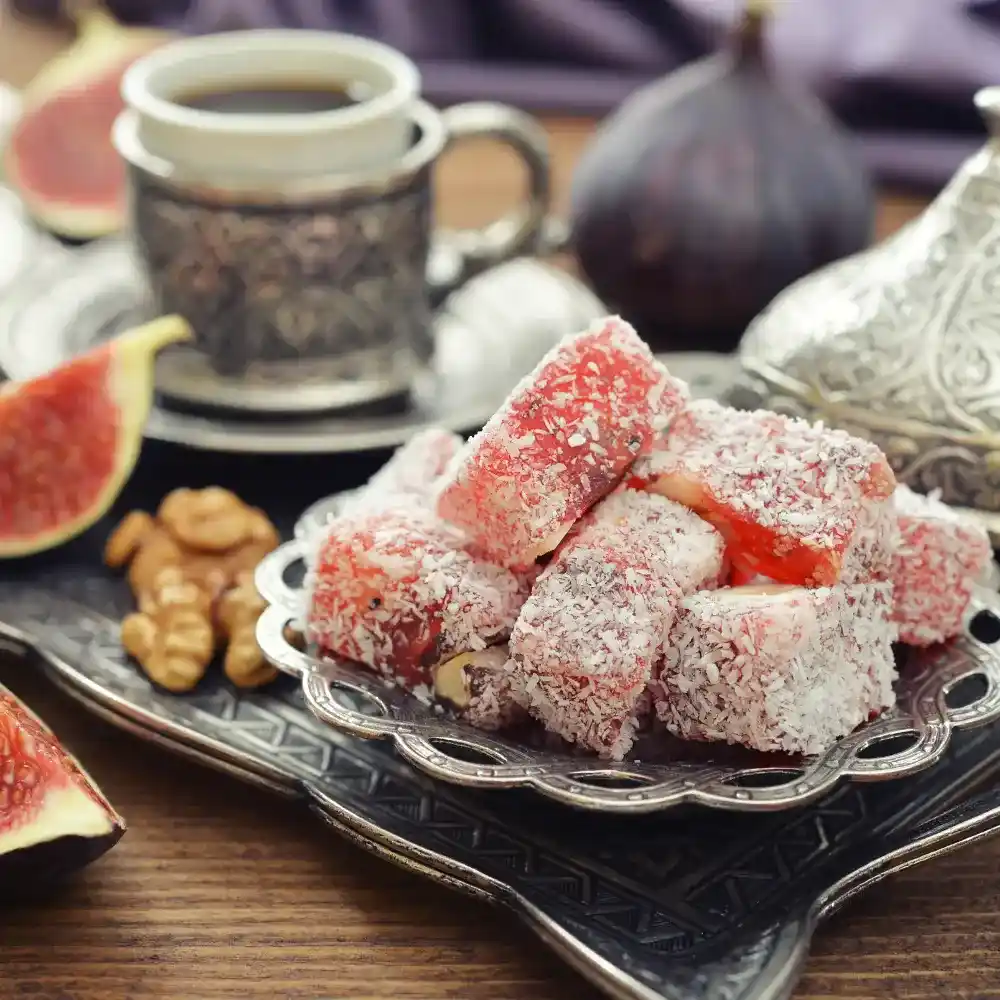
Turkish coffee is typically served with a glass of water and something sweet, like Turkish delight (lokum) or a piece of chocolate. The water is intended to cleanse the palate beforehand, allowing you to fully appreciate the rich flavors. The sweet treat helps balance the robust and intense taste of the coffee.
Additionally, baklava, a traditional Turkish pastry made with layers of filo filled with chopped nuts and sweetened with syrup or honey, can also be a delightful accompaniment to Turkish coffee.
Blending Turkish Coffee into Modern Recipes
In recent years, this drink has found its way into a host of innovative recipes, becoming a star ingredient in many modern culinary creations. Its unique taste and texture lend a touch of authenticity and intense flavor to these dishes.

For instance, Turkish coffee is used as a flavoring in cakes, cookies, and other desserts, adding a delightful coffee aroma and richness. It’s also used in savory dishes, where it imparts a deep, smoky flavor. Turkish coffee ice cream is another popular creation, a fusion of traditional and modern that offers a refreshing take on this beloved beverage.
The art of enjoying Turkish coffee extends beyond the brew itself. It’s a journey of taste, a cultural experience, and a symbol of hospitality and friendship. Whether served in traditional demitasse cups, paired with delectable treats, or blended into exciting new recipes, Turkish coffee offers a timeless and captivating drinking experience.
Myths and Misconceptions About Turkish Coffee
As with anything steeped in history and cultural significance, Turkish coffee is not immune to myths and misconceptions. From misunderstandings about its caffeine content to broader misconceptions about coffee culture, it’s time to debunk these common myths and shed light on the true charm of this drink.
Debunking Common Myths About Caffeine in Turkish Coffee
A common myth is that Turkish coffee contains an exceptionally high level of caffeine due to its strong taste and thick consistency. In reality, while Turkish coffee is indeed more concentrated than other forms of coffee, the total amount of caffeine in a standard serving is not significantly higher than in other coffee types. This is mainly because servings are typically smaller.
Another myth revolves around the idea that Turkish coffee is unhealthy due to its caffeine content. In fact, when consumed in moderation, the caffeine in Turkish coffee can offer health benefits such as improved mental alertness and cognitive function. Like any other caffeinated beverage, it’s about balance and moderation.
The Psychological and Social Aspects of Coffee Culture
In some circles, coffee culture, including the tradition of Turkish coffee, has been stereotyped as frivolous or non-productive. Yet, this couldn’t be further from the truth. The act of preparing, serving, and consuming coffee often fosters social connections and community. In Turkish culture, coffee is an expression of hospitality, a tool for social bonding, and even an avenue for artistic expression in the form of Turkish coffee fortune reading.

On the psychological front, the ritual of brewing and enjoying coffee can be a mindful exercise, a moment of relaxation, and a means of taking a break from the daily grind. Rather than being an unproductive activity, engaging in coffee culture contributes to mental wellness, social connection, and cultural preservation.
Challenging Stereotypes and Embracing Diversity in Turkish Coffee
This brew has sometimes been stereotyped as an ‘acquired taste,’ or as too strong and bitter for the average coffee drinker. However, such a perspective overlooks the diversity within Turkish coffee itself. From the level of sweetness (unsweetened, a little sweet, sweet, or very sweet) to the choice of spices (cardamom being a popular one), this beverage can be tailored to a variety of tastes and preferences.
Moreover, this stereotype fails to embrace the diversity of the global coffee culture. The beauty of this beverage lies in its variety – from the mild and creamy lattes to the strong and unadulterated espresso shots. Each type of coffee, Turkish included, brings something unique to the table, appealing to different tastes, moods, and cultural contexts.
By debunking myths, challenging stereotypes, and embracing the psychological, social, and cultural aspects of coffee, we can appreciate Turkish coffee for what it truly is – a rich, historic, and diverse form of coffee, deeply intertwined with the fabric of Turkish culture.
So, How Much Caffeine in Turkish Coffee? – Conclusion
As we reach the end of our exploration into the caffeine content and cultural significance of Turkish coffee, we find ourselves immersed in a blend of rich flavors, deep traditions, and a vibrant coffee culture. Understanding how much caffeine is in Turkish coffee, along with its potential health effects, allows us to appreciate this historic beverage while making informed decisions about our caffeine consumption.
This journey has taken us from the origins of Turkish coffee to the nuances of its brewing process, from the delicate balance of caffeine on our health to the art of savoring every sip. We’ve debunked myths, challenged stereotypes, and discovered that the Turkish coffee caffeine content, while potent, is balanced by smaller serving sizes.
Through all these aspects, this drink stands as a testament to Turkey’s vibrant culture, a symbol of hospitality, and a timeless tradition. So the next time you sip on a cup of Turkish coffee, remember that you’re not just consuming a caffeinated beverage; you’re partaking in a cultural ritual with each aromatic sip. And that’s a richness that extends beyond caffeine.
FAQ
Does Turkish coffee with cardamom contain more caffeine?
The addition of cardamom does not affect the caffeine content; it merely alters the flavor.
Can pregnant women safely consume Turkish coffee?
Pregnant women can consume Turkish coffee in moderation, but it's always best to consult a healthcare professional due to caffeine content. For more information on this topic, be sure to check out our article on: Can you drink coffee while pregnant?
Does the roasting level of coffee beans affect caffeine levels in Turkish coffee?
Indeed, the amount of caffeine in Turkish coffee may fluctuate based on several factors, including the variety of beans employed, the degree of roasting, and the brewing technique. Nevertheless, the information presented provides a broad reference for the typical caffeine content found in Turkish coffee.
What are the potential health risks associated with excessive Turkish coffee consumption?
Potential health risks of excessive Turkish coffee consumption include caffeine dependence, digestive issues, anxiety, and disrupted sleep patterns.














